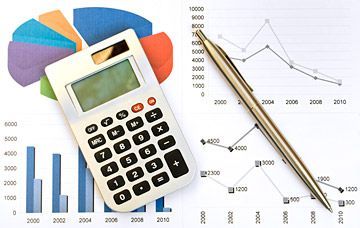When sports chiropractors first appeared at the Olympic Games in the 1980s, it was alongside individual athletes who had experienced the benefits of chiropractic care in their training and recovery processes at home. Fast forward to Paris 2024, where chiropractic care was available in the polyclinic for all athletes, and the attitude has now evolved to recognize that “every athlete deserves access to sports chiropractic."
Managing Your Money by Replacing the Unknown With the Known
John F. Kennedy wasn't known for his timidity. The fact is, his boldness was so attractive to Americans they elected him president of the United States. One intrepid idea that JFK espoused was, "It is a paradoxical truth that tax rates are too high and revenues are too low, and the soundest way to raise revenues in the long run is to cut taxes now." Isn't it interesting that the "less is more" truism holds water even when talking about revenues and taxes? Great men and women have always understood this concept. Author Faustino Ballve perhaps said it best nearly a century ago when he wrote, "Free trade or the free market means the sovereignty of the consumer."
Where Conventional Methods Fall Short
Conventional methods of wealth generation - working harder and longer, and investing in securities, bonds, money markets, capital ventures, real estate, 401(k), IRAs, etc. - don't always work. These methods are all mechanistic and therefore cannot project, and in fact don't even give credence to, the vitalistic component of the market. As a doctor, you know how foolish it would be to ignore the vitalistic component of healing. Vitalism can alter the complete outcome of any method, whether it concerns health or wealth.
In the market, vitalism can trigger market corrections and recessions. It can easily burst financial bubbles and create full-fledged depressions as well. Vitalism can trigger critical financial losses, create bankruptcies, and wipe out businesses, families and lifestyles. You see, vitalism is the unknown, and therefore unmanageable, risk that is inherently contained in each and every conventional method of wealth generation and/or preservation.
What if you could overcome the unknown risks by replacing them with a single known and manageable risk? Would that change the way you could build lasting wealth? You see, with a known risk, you can manage the consequences that risk will necessitate. With an unknown risk or risks, you're merely attempting to avoid the numerous consequences that might happen, but that you hope never will.
Managing a Single Known Risk
Managing for the inevitable is accomplished through the purchase of participating whole-life insurance. Now, before you throw in the towel, consider this simple fact: Life insurance companies use your premium dollars in much the same way banks do. They loan those premium dollars you deposit out to someone else who will pay the company back with interest. That is the way the insurance company can afford to pay your death benefit to your beneficiary. But as your death benefit grows, so does something else. This is overlooked, disregarded or even ridiculed by the vast majority of financial experts today "because it isn't sexy or new."1 But it's imperative to appreciate that your cash value grows inside participating whole life insurance without taxation.2 This is a tremendous benefit for you as the owner.

On top of this simple but tremendous benefit is the certainty that as the owner of the policy, contractually you are the first in line to borrow that money from the insurance company. Once you pay the insurance company back, the money is there for you to borrow again a second, a third or a fourth time, ad infinitum. And each time you pay the insurance company back, the amount available for you to borrow is greater than what you borrowed the last time around. Is that profitable or what? You better believe it's profitable! Why else would banks be allocating as much as 56 percent of their total tier-one assets to the purchase of bank-owned life insurance? And don't forget, while all this borrowing is going on, you continue to earn interest on 100 percent of the premiums you've paid into the policy until the day you die.
Now, those who derive some form of pleasure in paying interest to others, and are extremely excited about paying taxes on the interest earned and on money saved and invested, typically aren't interested in proceeding any further. Neither are those who really hope and trust that government will continue to find a way to support its juggling act of stealing from the working generation in order to pay off the generation they just finished robbing.
But if you aren't really excited, delighted or even slightly satisfied with these two options, then you need to pay close attention. Don't let anyone confuse you about what's going on here. It has nothing to do with interest rates. Notice JFK didn't say anything about cutting tax rates; he spoke about cutting taxes. Historically, whenever tax rates have gone down, tax revenues have gone up because tax exemptions disappeared. So, please don't get fixated on rates - either rates of return or annual percentage rates. That would be very allopathic; focusing on symptoms rather than the cause. Rates are only an aspect of dis-ease, not dis-ease itself.
Nevertheless, acknowledging dis-ease symptoms while focusing on correcting the subluxation, i.e., your current position in terms of the banking equation (how your money makes money - either for you or someone else), is a healthy perspective. Once your current position is adjusted, the following symptoms will just disappear. That's because the banking equation is constantly working in your life even though you may not be currently profiting from the wealth that it's generating. By purchasing and utilizing whole life insurance contract(s), you will contractually hold a profitable position in the banking equation, and the money that the banking equation always generates will now accrue as part of your revenue. The end result will be simple. You'll be much wealthier.
This is because if you currently have your money in conventional savings and/or investments, you are also losing the ability to use your money. If you take your money out of these conventional methods, then you will also pay the penalty and/or more taxes, and/or lose the growth potential of your money. If the market should fluctuate, you'll stand to lose your money unless you have a locked-in, guaranteed yield.
Important fact: A guaranteed yield and a guaranteed rate of return are not the same thing. Yields are tangible, rates of returns are not. If you have a locked-in guaranteed yield, you will still lose money if you pull your money out to use it for something else. If you decide to use someone else's money, you will lose the interest they will charge you for the use of their money. If you spend your money you are losing the potential growth on your money. If you're currently earning interest (experiencing growth) in a savings account, investment or some other venture, you are going to pay taxes on that growth. If you defer those taxes, you will pay even more tax later. When you die, someone you love will pay a lot of taxes on anything that remains of your wealth accumulation.
So, here are the crucial particulars of how to counter all that and manage your money in your best interest:
- Don't be afraid to capitalize. Pay yourself first. Save as much money as possible and deposit it as premiums in a properly designed life insurance policy or policies. All those deposits will earn you tax-free interest for a lifetime.
- Be honest with yourself. When you borrow against your cash values, pay yourself (the policy) the interest that you'd normally have paid someone else if you'd borrowed from them. Or if you've paid cash, then pay yourself what you would have lost because you spent your cash and couldn't earn interest on it.
- Remember, less is more!
When was the last time you got your banking equation adjusted? Get aligned properly and start experiencing the sovereignty of being the consumer. Start making money instead of losing it.
References
- "A Financial Bunker for Scary Times." Forbes.com, Feb. 10, 2009.
- "New Life for Life Insurance." Medical Economics, March 2009.


